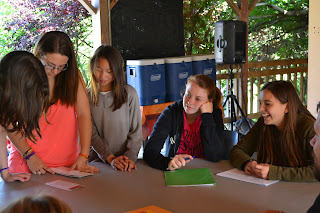L’Arcada (whose name means “The Arch” in Catalán) features
weeklong camps with themes such as English Camp, Adventure Camp, Basketball
Camp, Indian Camp (apparently, Native Americans are very popular in Spain), and
Family Camp. I came in during training for Family Camp. First, there’s a week
of training for the camp counselors and volunteers; then, the campers arrive
for a week of games, crafts, music and Bible lessons. The camps are very
popular, attracting more than a hundred kids every week; usually, the staff has
to close registration early because they’re as full as can be.
Kids stay the week in teepees instead of tents
The missionaries at L’Arcada describe their mission in
the following statement:
“L’Arcada is a Christian foundation in favor of the
family, whose goal is, through recreational education, to form solid families that
will contribute positively to the society. Every value and principle shared
during the camps is based on the Bible.”
That doesn’t mean every camper who attends the camp
is Christian; in fact, many aren’t. But as they return year after year (with
some campers starting at age four and continuing until adulthood), these
campers hear messages of God’s love for man and man’s need for God. The camp is
not a hard-core Christian camp like the ones we often find in the states, run
by Christians for Christians. This camp introduces Christian concepts to kids
who’ve never been to church or cracked open a Bible. The messages are softer,
simpler and perhaps more inviting. And many kids and families do come to know
Christ during their time at L’Arcada.
Girls at a Bible study and discussion session
L’Arcada was started in the 1980s by Dave and Debbie
Frank. Dave comes from Chicago and Debbie grew up the daughter of missionaries
in Peru. Originally, they considered starting a mission in Germany, but God led
them to Spain to open a summer camp that shared His message with the people of
Catalonia. Now, they have a camp that spans 750 acres at the base of the Pyrenees
Mountains and hundreds of visiting campers every year. In addition to the
camps, they host discipleship training, conferences and other year-round
projects. While Debbie and Dave are no longer the directors of L’Arcada, they
still organize Family Camp and work on many other projects.
David and Debbie Frank have shared the Gospel in Spain for more than 30 years
You might read this and think, “All this is
well and good, but shouldn’t missionaries focus on the areas that really need
them the most, like China and Kenya? Europe’s a Christian continent, isn’t it?
And isn’t Spain almost totally Catholic? They already know God!”
I admit, I thought that before I came over to help.
I figured there were still some people in Spain who needed God, but overall
most of them would be believers. After all, Europe led the great Reformation
and still has Christian rulers heading the countries. But it turns out, that
view of Europe is really behind the times. According to Dave and Debbie, only
3% of Spaniards consider religion to be one of the three most important values
in their lives. Three percent! Sure, 80% of Spaniards say they’re Roman
Catholic, but in reality only 10% actually practice. The rest consider
Catholicism more cultural than spiritual; they’re Catholic because they’re
Spanish. Only 0.3% of Spaniards are evangelical Christians, and about 7,500 of
Spain’s 8,105 cities and towns don’t even have an evangelical church.
Christians sometimes need to drive hours to go to church in the morning.
That’s a far cry from the Spain we imagine after
learning about the country in history class. Spain was one of Roman Catholicism’s
biggest supporters, boasting “the Catholic Monarchs” Isabel and Ferdinand and
being called “more Catholic than the pope” at one time. Now, most Spaniards
avoid religion religiously. Why? One factor was the late Franco regime. Franco
was a strict Catholic and not only installed Catholicism as the official
religion in Spain but also persecuted anyone who wasn’t Catholic. For this
reason, many people drew away from any form of Christianity once he was out of
power. Even supporters of the Catholic Church started questioning the
institution when faced with the church’s dealings in politics and the vast
amount of land and wealth it has accrued over the years, which many people
resent during Spain’s time of economic difficulties. Another reason is all the
Muslim immigrants who are moving into Spain and bringing their religion of
Islam. Catalonia has the largest amount of Muslims in Spain. In addition, recent
studies show there are more than 300 cults in Spain, including 61 satanic
groups.
While people tend to think that only third-world
countries need the Gospel, this is simply not the case. In fact, China claims
more Christians than all of Europe. I don’t think that means we should all rush
over to evangelize Europe, but I do think we can learn from this: People need
the Gospel everywhere. People need the Gospel in Ghana and people need the
Gospel in Wisconsin. No matter where we are, we can share the good news of
Christ. In fact, we’re called to! We don’t have to be missionaries living in
huts in a foreign land. If that’s where God calls you, fantastic! But He also
called people to witness at work, at school and to their own families. Where is
He calling you?
The volunteers for this year's Family Camp
“How, then, can they call on the one they have not
believed in? And how can they believe in the one of whom they have not heard?
And how can they hear without someone preaching to them? And how can anyone
preach unless they are sent? As it is written: ‘How beautiful are the feet of
those who bring good news!’” (Romans 10:14-15)


















